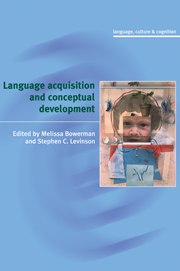Book contents
- Frontmatter
- Contents
- Preface
- Introduction
- Part 1 Foundational issues
- Part 2 Constraints on word learning?
- Part 3 Entities, individuation, and quantification
- 7 Whorf versus continuity theorists: bringing data to bear on the debate
- 8 Individuation, relativity, and early word learning
- 9 Grammatical categories and the development of classification preferences: a comparative approach
- 10 Person in the language of singletons, siblings, and twins
- 11 Early representations for all, each, and their counterparts in Mandarin Chinese and Portuguese
- 12 Children's weak interpretations of universally quantified questions
- Part 4 Relational concepts in form–function mapping
- Author index
- Subject index
12 - Children's weak interpretations of universally quantified questions
Published online by Cambridge University Press: 26 January 2010
- Frontmatter
- Contents
- Preface
- Introduction
- Part 1 Foundational issues
- Part 2 Constraints on word learning?
- Part 3 Entities, individuation, and quantification
- 7 Whorf versus continuity theorists: bringing data to bear on the debate
- 8 Individuation, relativity, and early word learning
- 9 Grammatical categories and the development of classification preferences: a comparative approach
- 10 Person in the language of singletons, siblings, and twins
- 11 Early representations for all, each, and their counterparts in Mandarin Chinese and Portuguese
- 12 Children's weak interpretations of universally quantified questions
- Part 4 Relational concepts in form–function mapping
- Author index
- Subject index
Summary
Children's reasoning with universal quantifiers like every and all has been an important topic in developmental psychology and psycholinguistics since Piaget's class inclusion studies. One puzzle is why children make two particular kinds of unexpected responses when asked questions like Is every boy riding an elephant?
One type of error occurs when a child is presented with a picture like those shown in figures 12.1a and b and asked to judge whether every boy is riding an elephant in that context. The picture in figure 12.1a depicts an incomplete one-to-one matching context in which each of three boys is riding a different elephant, leaving one elephant unridden. Figure 12.1b depicts a many-toone matching in which three boys are all riding one elephant, leaving two elephants unridden. Adults typically say yes on these tasks, but some children say no.When asked to explain, they point out the unridden elephant or elephants, in a way that suggests that they expected to see each of the elephants matched with a boy. Let us call this the “exhaustive pairing error.”
The other type of error occurs when children are presented with a picture like that in figure 12.2 and asked the same question. Some children answer yes on this task, suggesting that they may fail to search exhaustively through an entire domain of objects, even when that domain is perceptually available. Let us call this the “underexhaustive pairing error.”
- Type
- Chapter
- Information
- Language Acquisition and Conceptual Development , pp. 340 - 376Publisher: Cambridge University PressPrint publication year: 2001
- 31
- Cited by



